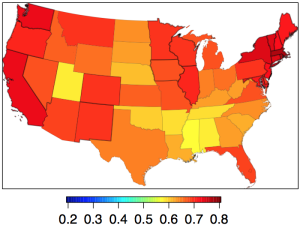Majorities in public and in politics
From Andrew Gelman, who is passing along research by some Columbia political scientists, the estimated support, by state, for the Employment Nondiscrimination Act, a gay rights bill that the US Senate will be voting on this Monday.
US Senators are elected by, and theoretically represent, their state as a whole. The bill has majority support in every state, well over 60% in most states. It’s not clear whether it will pass.
Part of the problem is multilevel democracy: to be a Senator, you have to be selected as a candidate as well as winning the election. And the people who vote at the preselection stage (primary elections, in the US) average more extreme than those who vote in the election. The more levels of selection you need, the worse the problem gets: Tim Gowers (prompted by the US government shutdown) does the mathematician thing and derives the extreme case. And the problem is exacerbated by the fact that politicians aren’t as knowledgeable about the views of their electorates as they think are.
Thomas Lumley (@tslumley) is Professor of Biostatistics at the University of Auckland. His research interests include semiparametric models, survey sampling, statistical computing, foundations of statistics, and whatever methodological problems his medical collaborators come up with. He also blogs at Biased and Inefficient See all posts by Thomas Lumley »

Also, there is the fact that this is not likely to be a tipping point issue for many voters. Anyone who would not vote for a politician who opposed ENDA would probably not vote for a Republican even if s/he supported ENDA and those who wouldn’t vote for an ENDA supporter would not vote Democrat even if s/he opposed it. That means that there is very little potential gain from politicians even paying attention to polls on this issue.
Frankly, I find polls like this to be highly misleading when they don’t even attempt to quantify how much respondents care about an issue. In my case, I would probably lean towards supporting the law (it depends on exactly how it is written–a lot of laws like this are more lawsuit-bait than actually helping anyone). However, if you asked me the top 50 issues I would look for in a candidate, ENDA would not even make the list.
11 years ago